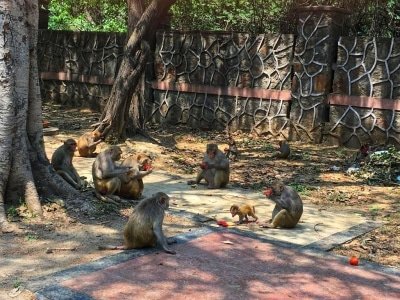<br>The government wants the farmers to fire the bullet to kill the crop invaders. The farmers say this is no monkey business and want the government to do its bit to save them from damages.
The reason behind the reluctance of the farmers and the government is not hard to comprehend.
The monkey is considered holy in India and has a special place in the hearts of the people with temples in the state dedicated to the monkey god Hanuman.
With the mass surgical sterilisation of monkeys or rhesus macaque has been undergoing since 2007, the state believes their select killing on the demand of the farmer lobbies will somehow help pacifying their anger over the vast crop depredation.
Now again a notification for the killing of monkeys in the private areas, fourth in a series since 2017, has been issued by the Union Ministry of Environment, Forests and Climate Change.
The one-year permission, granted on the request of the state government, is applicable in 91 tehsils without facing penalties. It is not applicable in government and forest areas.
The monkeys, which are protected under Schedule II of the Wildlife (Protection) Act of 1972, are allowed to be hunted after declaring it as a ‘vermin’ for a specific period if it poses a danger to humans or property.
Vermin refers to pests or nuisance animals which destroy crops.
State wildlife officials told IANS on Sunday that in the past three years, there is hardly any instance of rampant killing of monkeys in the state.
“There are reports of sporadic killing in some pockets of Sirmaur, Mandi and Solan districts. Till date no farmer in the state has claimed a compensation of Rs 500 from the government by producing a carcass of the monkey shot dead by the bullet,” an official, who wish not be quoted, said.
“We have reports of killing of a few monkeys in those areas that are dominated by the Rajputs. Our area is dominated by Brahmins and we don’t encourage killing of any species,” vegetable grower Naresh Sharma in Paonta Sahib in Sirmaur district said.
“We know they are pests and destroying the crops massively. But we try to shoo their troops by bursting crackers,” he added.
However, the issue of notification every time is inviting ire of wildlife conservationists.
Animal Welfare Board of India (AWBI) member Girish J. Shah, in a missive to the Union environment minister, raised objections against their mass killing without considering environmental, ethical, ecological and sentimental or emotional issues.
“Killing of any animal is not a solution. Once it will be encouraged, it will raise serious ecological and environmental issues,” he said.
Seeking withdrawal of the notification, Shah said trans-locating monkeys and establishment of sanctuaries would be useful and easy to manage their population instead of killing them.
Wildlife officials in the state favour monkey sterilisation the best viable option to keep their population under control.
Chief Wildlife Warden Savita told IANS that 1.62 lakh monkeys have been sterilised in Himachal Pradesh since 2007, preventing the birth of over four lakh rhesus macaques.
She said the current population of the monkeys in the state is 136,443 — a fall by 33.5 per cent since the last census five years ago.
Barring Lahaul-Spiti district and some pockets in Kinnaur district, Himachal Pradesh is in the grip of monkey menace as they have caused crop losses worth hundreds of crores of rupees in recent years.
As the religious sentiments prevent the people from killing the monkeys, their population is multiplying and their menace has increased manifold in cities and villages.
Marauding monkeys, prowling in gangs on streets of Shimla, Kasauli, Chail, Manali and other tourist resorts create panic among residents and tourists. They have been causing havoc by biting passersby and snatching food.
Activists working for the cause of farmers have been demanding the monkeys should either be eliminated professionally by hiring hunters or lifting the ban on the export of monkeys for bio-medical research to check their rising numbers.
The central government had banned the export of wild animals in 1978.
In the latest written reply, Forest Minister Govind Thakur informed the Assembly that apart from monkey sterilization, a habitat enrichment plantation scheme is being implemented under which fruit bearing trees of different species are being planted in 10 adversely affected forests for providing natural food resource for the monkeys and other wild animals so that they may not come over to agricultural fields.
Himachal Pradesh has declared nine species of wild animals as crop damaging animals.
Besides the monkey, they are the wild boar, blue bull, porcupine, jackal, chittal, sambar, hare and the parrot. All of them are protected under the Wildlife Protection Act of 1972.
(Vishal Gulati can be contacted at vishal.g@ians.in)
–IANS<br>vg/rs/
